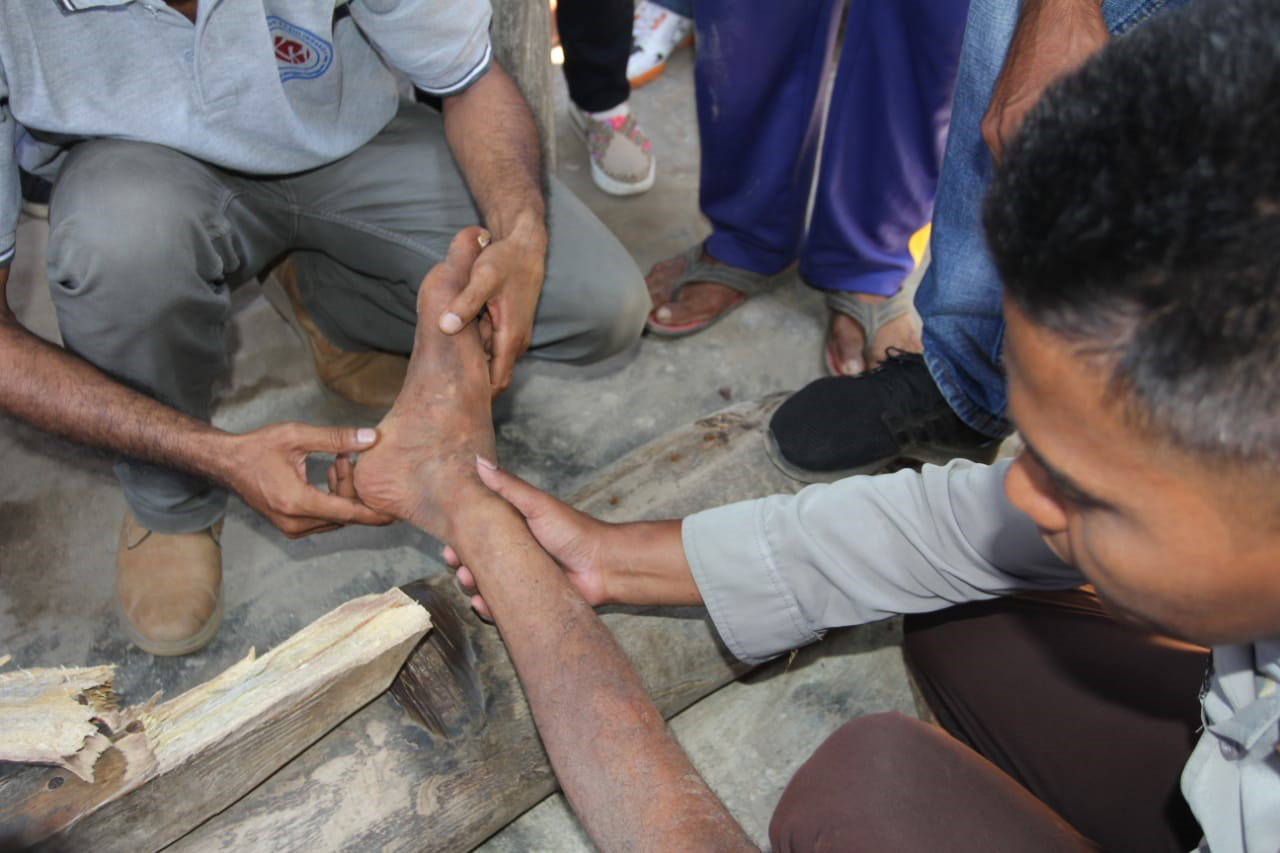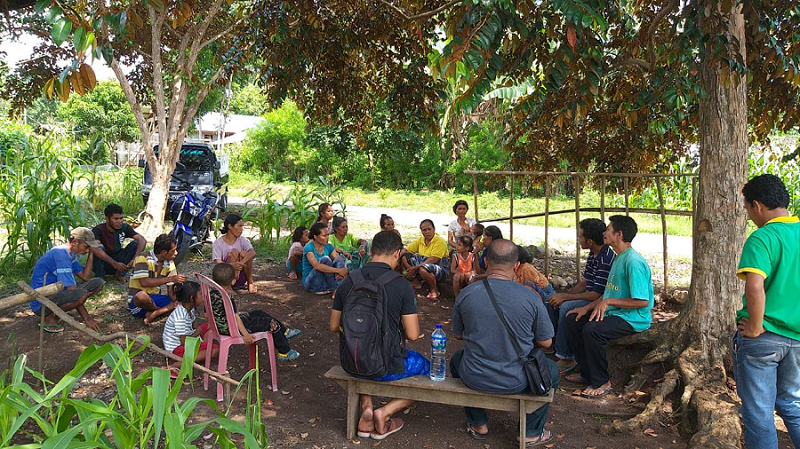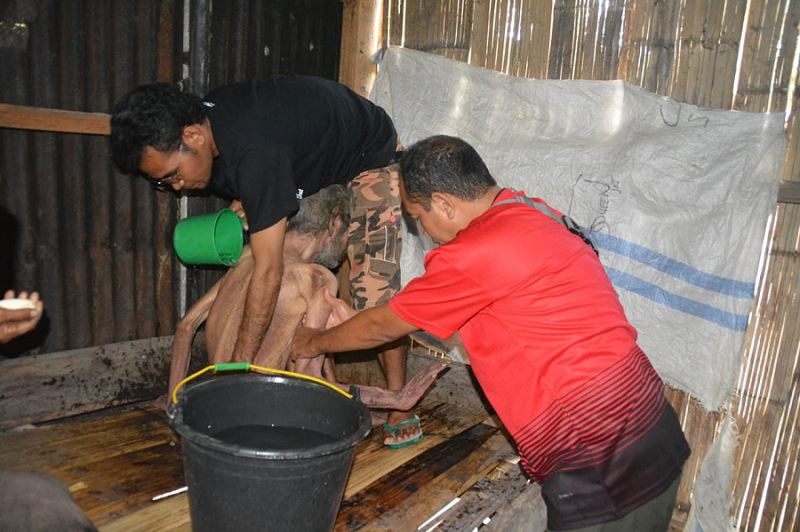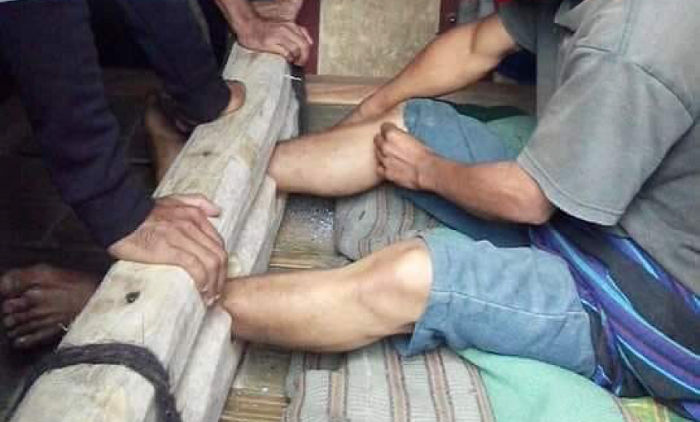The practice of shackling and imprisoning people with mental health conditions, known as pasung, is prevalent in Indonesia. The individuals are forced by their families and society to stay in isolated rooms; their hands are tied with chains and wooden beams. This action violates human rights. It causes people with mental health conditions to feel more isolated from their families and society, and increases their risk of infectious diseases from poor sanitation and hygiene. Compounding this, they are unable to access needed quality health services.

A mental health patient is released from pasung - photo was taken before the COVID-19 pandemic.
Photo credit: Saturninus
Recognising that mental health conditions can be managed effectively and the imperative to protect and promote human rights, the Ministry of Health (MoH) launched the "Indonesia Free from Pasung" programme in 2010 to eliminate pasung nationally. The programme primarily aims to protect the human rights of people with severe mental illness. It does so by building the capacity of stakeholders and increasing access to quality services across all levels. It also strives to provide adequate funding, and ensure collaboration and coordination across sectors to implement mental health initiatives and sustainable monitoring and evaluation systems.
On this Human Rights Day, WHO celebrates two Indonesian activists, Pater Avent Saur and Marsuan. The prevalence of pasung, combined with the limited access to mental health care in Indonesia, has led these activists to create health care programmes specifically for those with mental health conditions. As an acknowledgement of their hard work in fighting for the rights of people with mental health conditions, in November 2019, both activists received the “Outstanding Achievement in the field of Mental Health Care” award from the Swiss Foundation for World Health and WHO. The prestigious award is given to those whose efforts have led to a significant improvement in the provision of mental health care.
Marsuan’s story
Marsuan works as a local government official in Muara Enim District Health Office, South Sumatera. His involvement in mental health began when he found out that people with mental health conditions had no access to health care, and many were shackled or imprisoned in their own homes. He has strong feelings about this issue because he believes that they are humans and they deserve to be treated like human beings; releasing them from pasung is just a start. Marsuan was determined to find better solutions to tackle these issues. He initiated a programme that allowed psychiatrists and nurses in South Sumatera to provide field trainings for health workers in Muara Enim. His efforts finally led to the integration of mental health services in primary health care and it opened many windows of opportunity.
Thanks to Marsuan’s work, non-specialist mental health workers (including general practitioners and nurses) can now provide care to people with mental health conditions. Knowing that the availability of psychotropic medicines is also an important factor to ensure care, Marsuan rigorously supervises the supply and distribution planning of these medicines. In addition to this, he also runs an advocacy programme for non-health stakeholders to raise awareness and end the discrimination of people with mental health conditions within the community. This led to the enactment of the district regulation to stop pasung. At the time of his award, Marsuan has saved 63 people from pasung. He continues to dedicate his life to end this cruel practice in Indonesia.
Pater Avent Saur’s story
Pater Avent Saur, SVD, is a Catholic priest who has been caring for people with mental health conditions in the South-East province of East Nusa Tenggara since 2014. In 2016, he founded a non-government organization called Kelompok Kasih Insanis (KKI), which now has over 600 members working in Ende, Sikka, Manggerai, and Kupang. KKI supports people with mental health conditions and their families to fulfil their daily needs, from washing and changing clothes, to providing food. Pater Avent also tries to connect patients and their families with appropriate professional health workers.

Pater Avent leads discussions on mental health issues with communities - photo was taken before the COVID-19 pandemic. Photo credit: Saturninus, Kelompok Kasih Insanis
Pater Avent believes that by locking up people with mental health conditions, we are also locking up our conscience with them. Together with his community support group, he strives to continuously promote mental health issues and release mental health patients from pasung. His efforts have led to extraordinary achievements, including significantly increased awareness of mental health in the local community. To date, more than 6 000 people with mental health conditions have been identified, 120 restrained patients have been released, and 100 homeless people were reunited with their families or placed in a community home.

Pater Avent encourages his patients’ families to take care of the patient - photo was taken before the COVID-19 pandemic. Photo credit: Saturninus, Kelompok Kasih Insanis
 Pater Avent providing psychological support to his patient - photo was taken before the COVID-19 pandemic. Photo credit: Saturninus, Kelompok kasih insanis
Pater Avent providing psychological support to his patient - photo was taken before the COVID-19 pandemic. Photo credit: Saturninus, Kelompok kasih insanis
The determination and efforts of both awardees have led to a significant improvement in the provision of mental health care in Indonesia.
Continuing mental health services during the pandemic
During this COVID-19 pandemic, the local champions are continuing their efforts to end shackling. Pater Avent strives to ensure that patients get the healthcare they need, when primary health care services have become limited during the pandemic. Using online tools to communicate, he continuously educates them and their families about COVID-19 and how to maintain physical and mental health. As the pandemic has impacted the financial situation of the families, his organization also provides support by distributing food packages to ease their burden.
